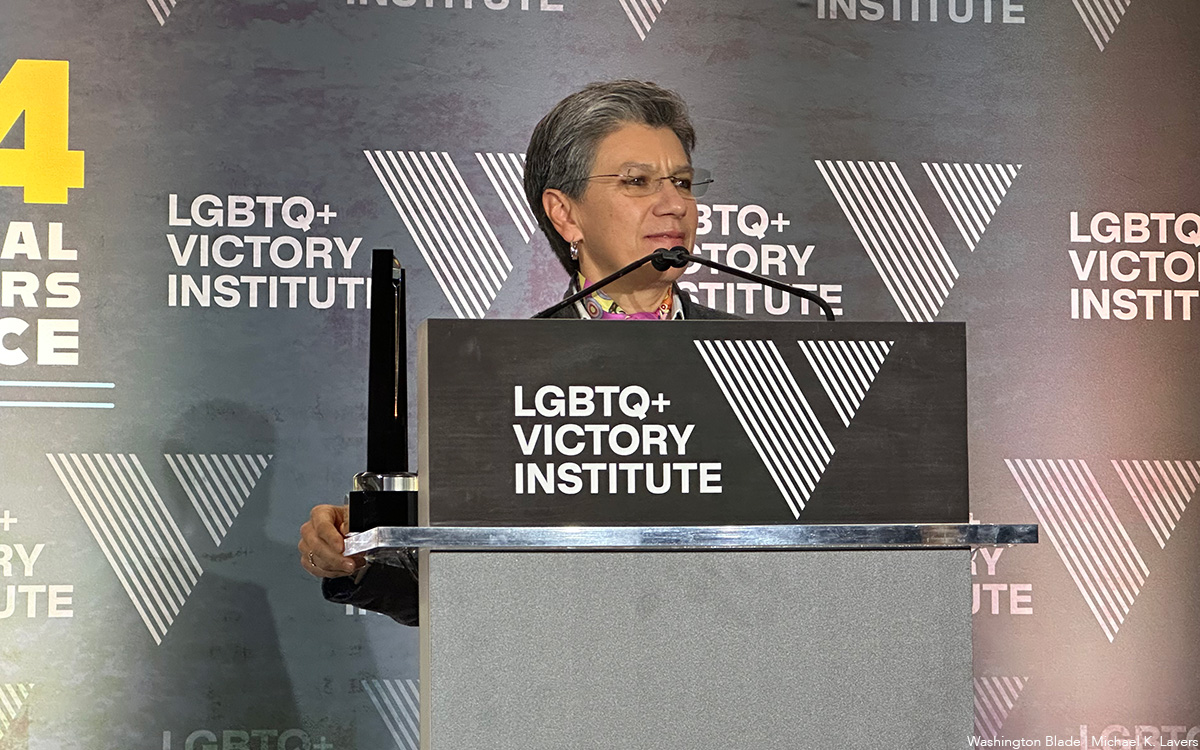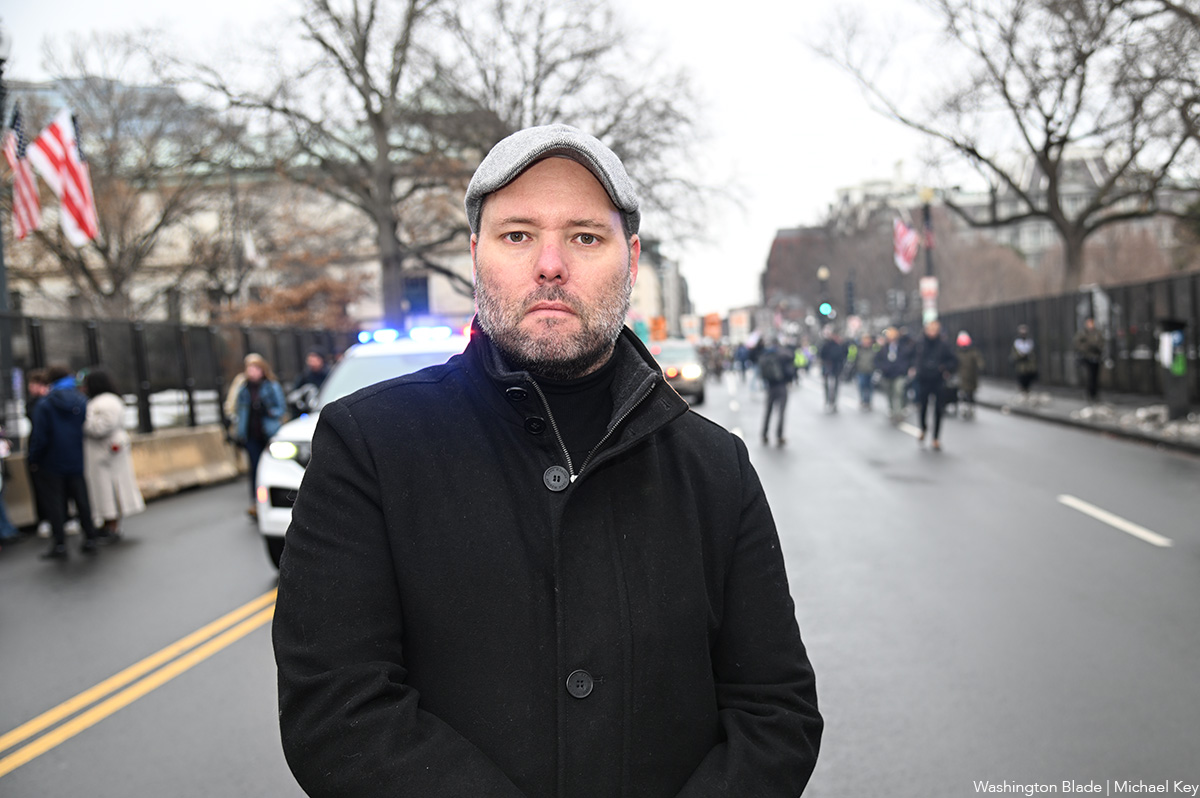World
Out in the World: LGBTQ news from Asia, Europe, and Canada
Japanese prime minister backs marriage equality without legislative commitment

JAPAN
Japanese Prime Minister Shigeru Ishiba told parliament that he believed legalizing same-sex marriage would make the country happier, although he has no plan to bring forward legislation to make that happen.
The remarks, which were echoed days later by Justice Minister Keisuke Suzuki, have buoyed the spirits of equal marriage campaigners in the country, despite the government’s lack of commitment to progress on the issue.
“Compared to other prime ministers, there is a big difference in Ishiba’s tone, his direction and his outlook and we are clearly getting to the stage for Japan to take the next step in the right direction,” marriage equality activist Alexander Dmitrenko told This Week in Asia.
Equal marriage advocates have been waging a long battle through both the courts and the political process to win same-sex marriage rights.
Earlier this month, a third appellate court ruled that the ban on same-sex marriage violates the Japanese constitution, finding for the first time that the ban violates the constitutional right to the pursuit of happiness. Five out of six lower courts that have heard cases seeking equal marriage have also ruled for equality.
Elections in October yielded a parliament that has a majority in favor of equal marriage, but is still dominated by the largely conservative Liberal Democratic Party, which has formed a minority government.
While Ishiba says he will not bring forward same-sex marriage legislation and is instead following the progress of cases through the courts for now, it is possible that other parties may try to force the issue by introducing their own bills.
“The Fukuoka court has clearly said that the Diet must legally permit same-sex marriages in the same way that marriages between people of opposite sexes are recognized,” Takeharu Kato, one of the lawyers in the equal marriage case that was heard in Sapporo.
“We intend to continue to put strong pressure on the government to realize these changes because we are confident that we are nearly there.”
PHILIPPINES
Government workers in the Philippines now have the right to dress according to their gender identity, under a new official dress code issued by the Civil Service Commission issued this month.
The Philippines’ civil service is known for its strict dress code for government workers. Workers are required to wear specific locally inspired outfits on Mondays and have been required to wear gender-conforming smart casual office attire on other workdays.
Under the revised dress code, workers are freer to dress according to their gender identity, and female workers are freer to wear either skirts or pants. The new code also relaxes standards relating to tattoos, facial piercings, and hairstyles, as long as they don’t interfere with the employee’s work or with safety standards.
Gender-inclusive dress codes have become a much-debated topic in the Philippines in recent years, particularly in schools and universities, where uniforms and dress codes are often strongly enforced. A growing number of institutions have adopted gender-neutral dress codes and uniforms, while the national government says it is studying creating a standard for gender-inclusive dress codes to promote equality.
In another positive development for LGBTQ Filipinos, Globe Telecom, one of the country’s largest mobile providers, has announced it will provide spousal benefits to same-sex partners of its employees.
Same-sex couples have no legal recognition in the Philippines. A civil union bill has been proposed several times in Congress, but has never advanced.
LITHUANIA
Lithuania’s constitutional court struck down an “LGBT Propaganda” law this week, in a ruling that ought to bring relief to queer activists, publishers, and media outlets.
The “Law on the Protection of Minors,” which was passed in 2009, banned the promotion of sexual relations or non-traditional conceptions of marriage or family, and drew sharp criticism from queer and civil liberties groups across Europe. It has been used in attempts to ban Vilnius Pride and led broadcasters to restrict advertisements for queer events and causes.
In one landmark case, government censors used the law to restrict distribution of books of children’s stories due to its depiction of two same-sex couples. That decision was eventually appealed to the European Court of Human Rights, which found last year that the law violated the European Convention’s guarantee of free expression.
Following the ruling, the previous government tried to repeal the law, but after its bill was voted down by parliament, the government filed this legal challenge to the constitutional court.
“Finally, we are normalizing the portrayal and life of our community, and I believe that LGBT youth will live a freer life,” Vladimiras Simonko, head of the Lithuanian Gay League, told LRT.
The court ruled that the law’s anti-LGBTQ sections were unconstitutional restrictions on free expression, and were also too vague, as they did not define what kinds of information disparage family values.
The court also found that the implications of the law also unfairly narrow the definition of family found in the constitution.
Same-sex couples are not legally recognized in Lithuania. A bill to recognize civil unions was introduced by the previous government but awaits a final vote before it can be brought into law. The current government has not made passing the bill a priority.
CANADA
The province of New Brunswick has finally repealed regulations that required schools to notify parents and receive their consent if a student wishes to use a different name or pronoun in class, following a change in government in October.
The Canadian Civil Liberties Association, which had brought a legal challenge against the original policy, hailed the changes.
“We will discuss with our legal counsel and affected community groups, but expect that these changes will resolve legal issues in our constitutional challenge,” CCLA Director of Equality Programs Harini Sivalingam told CBC.
The controversial regulation, known as Policy 713, was brought forward by the province’s previous Progressive Conservative Party government under former Premier Blaine Higgs. The regulation, which was introduced with limited consultation, led several of Higgs’ Cabinet ministers to resign in protest, and led the charge for provincial conservatives to campaign on anti-trans policies across Canada.
That strategy tended not to work for conservatives. In October, Higgs’s government was voted out in favor of the New Brunswick Liberals under Susan Holt, who had pledged to rescind the policy and ensure schools are welcoming for all LGBTQ students.
Similarly, Manitoba’s PC government was voted out in May after pledging to introduce a similar policy, and the British Columbia Conservatives lost their bid to replace the province’s NDP government in elections in October.
Still, Saskatchewan’s conservative government won reelection in October after introducing a similar policy earlier in the year, and Alberta’s conservative government just passed some of the most sweeping anti-transgender legislation Canada has seen in quite some time, including bans on classroom discussion of LGBTQ issues and participation in gender-appropriate sports.
Alberta’s anti-trans laws have already been challenged in court, but Saskatchewan’s government used a constitutional provision to prevent any legal challenges to its anti-trans laws for five years after an initial loss in court.
But conservative governments in Ontario and Quebec, which had initially announced plans to introduce parent notification and consent rules for trans students, have yet to bring forward such policies or regulations.
Colombia
Gay Venezuelan man who fled to Colombia uncertain about homeland’s future
Heberth Aguirre left Maracaibo in 2018

BOGOTÁ, Colombia — A gay Venezuelan man who has lived in Colombia since 2018 says he feels uncertain about his country’s future after the U.S. seized now former Venezuelan President Nicolás Maduro.
“On one hand I can feel content, but on the other hand I feel very concerned,” Heberth Aguirre told the Washington Blade on Tuesday during an interview at a shopping mall in Bogotá, the Colombian capital.
Aguirre, 35, is from Maracaibo, Venezuela’s second-largest city that is the heart of the country’s oil industry.
He developed cultural and art initiatives for the Zulia State government.
“Little by little, I suddenly became involved in politics because, in a way, you had to be involved,” recalled Aguirre. “It was necessary to be involved because the regime often said so.”
“I basically felt like I was working for the citizens, but with this deeply ingrained rule we had to be on their side, on the side of the Maduro and (former President Hugo) Chávez regime,” he added.
Maduro in 2013 became Venezuela’s president after Chávez died.
“There are things I don’t support about the regime,” Aguirre told the Blade. “There are other things that were nice in theory, but it turned out that they didn’t work when we put them into practice.”
Aguirre noted the Maduro government implemented “a lot of laws.” He also said he and other LGBTQ Venezuelans didn’t “have any kind of guarantee for our lives in general.”
“That also exposed you in a way,” said Aguirre. “You felt somewhat protected by working with them (the government), but it wasn’t entirely true.”
Aguirre, 35, studied graphic design at the University of Zulia in Maracaibo. He said he eventually withdrew after soldiers, members of Venezuela’s Bolivarian National Guard, and police officers opened fire on students.
“That happened many times, to the point where I said I couldn’t keep risking my life,” Aguirre told the Blade. “It hurt me to see what was happening, and it hurt me to have lost my place at the university.”
Venezuela’s economic crisis and increased insecurity prompted Aguirre to leave the country in 2018. He entered Colombia at the Simón Bolívar Bridge near the city of Cúcuta in the country’s Norte de Santander Province.
“If you thought differently, they (the Venezuelan government) would come after you or make you disappear, and nobody would do anything about it,” said Aguirre in response to the Blade’s question about why he left Venezuela.
The Simón Bolívar Bridge on the Colombia-Venezuela border on May 14, 2019. (Washington Blade video by Michael K. Lavers)
Aguirre spoke with the Blade three days after American forces seized Maduro and his wife, Cilia Flores, at their home in Caracas, the Venezuelan capital, during an overnight operation.
The Venezuelan National Assembly on Sunday swore in Delcy Rodríguez, who was Maduro’s vice president, as the country’s acting president. Maduro and Flores on Monday pleaded not guilty to federal drug charges in New York.
President Donald Trump on Tuesday in a Truth Social post said Venezuela’s interim authorities “will be turning over between 30 and 50 million barrels of high quality, sanctioned oil, to the United States of America.”
“This oil will be sold at its market price, and that money will be controlled by me, as president of the United States of America, to ensure it is used to benefit the people of Venezuela and the United States,” wrote Trump.
Trump on Sunday suggested the U.S. will target Colombian President Gustavo, a former Bogotá mayor and senator who was once a member of the M-19 guerrilla movement that disbanded in the 1990s.
Petro has urged Colombians to take to the streets on Wednesday and “defend national sovereignty.” Claudia López, a former senator who would become the country’s first female and first lesbian president if she wins Colombia’s presidential election that will take place later this year, is among those who criticized Trump’s comments.
“Let’s be clear: Trump doesn’t care about the humanitarian aspect,” said Aguirre when the Blade asked him about Trump. “We can’t portray him as Venezuela’s savior.”
Meanwhile, Aguirre said his relatives in Maracaibo remain afraid of what will happen in the wake of Maduro’s ouster.
“My family is honestly keeping quiet,” he said. “They don’t post anything online. They don’t go out to participate in marches or celebrations.”
“Imagine them being at the epicenter, in the eye of the hurricane,” added Aguirre. “They are right in the middle of all the problems, so it’s perfectly understandable that they don’t want to say anything.”
‘I never in my life thought I would have to emigrate’
Aguirre has built a new life in Bogotá.
He founded Mesa Distrital LGBTIQ+ de Jóvenes y Estudiantes, a group that works with migrants from Venezuela and other countries and internally placed Colombians, during the COVID-19 pandemic. Aguirre told the Blade he launched the group “with the need to contribute to the general population, not just in Colombia.”
Aguirre met his husband, an American from California, at a Bogotá church in December 2020 during a Christmas event that SDA Kinship Colombia, an LGBTQ group, organized. A Utah judge virtually officiated their wedding on July 12, 2024.
“I love Colombia, I love Bogotá,” said Aguirre. “I love everything I’ve experienced because I feel it has helped me grow.”
He once again stressed he does not know what a post-Maduro Venezuela will look like.
“As a Venezuelan, I experienced the wonders of that country,” said Aguirre. “I never in my life thought I would have to emigrate.”
The Colombian government’s Permiso por Protección Temporal program allows Aguirre and other Venezuelans who have sought refuge in Colombia to live in the country for up to 10 years. Aguirre reiterated his love for Colombia, but he told the Blade that he would like to return to Venezuela and help rebuild the country.
“I wish this would be over in five years, that we could return to our country, that we could go back and even return with more skills acquired abroad,” Aguirre told the Blade. “Many of us received training. Many of us studied a lot. We connected with organizations that formed networks, which enriched us as individuals and as professionals.”
“Returning would be wonderful,” he added. “What we’ve built abroad will almost certainly serve to enrich the country.”
Colombia
Claudia López criticizes Trump over threats against Colombian president
Presidential candidate would become country’s first lesbian head of government

BOGOTÁ, Colombia — Colombian presidential candidate Claudia López has criticized President Donald Trump after he suggested the U.S. will target Colombian President Gustavo Petro.
“Colombia is very sick, too, run by a sick man, who likes making cocaine and selling it to the United States, and he’s not going to be doing it very long,” Trump told reporters on Air Force One on Sunday.
Trump made the comments a day after American forces carried out an overnight operation and seized now former Venezuelan President Nicolás Maduro and wife, Cilia Flores, at their home in Caracas, the Venezuelan capital.
Maduro and Flores on Monday pleaded not guilty to federal drug charges in New York.
Petro is a former Bogotá mayor and senator who was once a member of the M-19 guerrilla movement that disbanded in the 1990s. He has urged Colombians to take to the streets and “defend national sovereignty.”
“Colombians are the ones who decide who governs Colombia,” said López on her X account. “President Gustavo Petro won free elections and has a constitutional mandate.”
López did not mention Trump by name in her comment.
The first-round of Colombia’s presidential election will take place on May 31. The country’s 1991 constitution prevents Petro from seeking re-election.
López in 2019 became the first woman and first lesbian elected mayor of Bogotá, the Colombian capital and the country’s largest city. She took office on Jan. 1, 2020, less than a month after she married her wife, Colombian Sen. Angélica Lozano.
“This year we will decide at the polls what direction (the country) is heading and what leadership will advance Colombia,” said López in her X post. “Supporting soft dictatorships and attacking democracies is an absurd and unacceptable political action by the United States towards Colombia, Venezuela, and Latin America.”
Quién gobierna en Colombia lo decidimos los colombianos.
El presidente @petrogustavo ganó unas elecciones libres y tiene un mandato constitucional. Este año decidiremos en las urnas qué rumbo y a cargo de qué liderazgo avanza Colombia.
Sostener dictablandas y atacar democracias… https://t.co/K61G2QUcck— Claudia López Hernández (@ClaudiaLopez) January 5, 2026
López would be Colombia’s first female president if she wins the election. López would also become the third openly lesbian woman elected head of government — Jóhanna Sigurðardóttir was Iceland’s prime minister from 2009-2013 and Ana Brnabić was Serbia’s prime minister from 2017-2024.
The LGBTQ+ Victory Institute in 2024 honored López at its annual International LGBTQ Leaders Conference in D.C. The Washington Blade interviewed her during the gathering.
Colombia
Blade travels to Colombia after U.S. forces seize Maduro in Venezuela
Former Venezuelan president, wife seized on Saturday

Washington Blade International News Editor Michael K. Lavers will be on assignment in Colombia through Jan. 10.
Lavers arrived in Bogotá, the Colombian capital, on Monday. American forces two days earlier carried out an overnight operation and seized now former Venezuelan President Nicolás Maduro and wife, Cilia Flores, at their home in Caracas, the Venezuelan capital.
Maduro and Flores on Monday pled not guilty to federal drug charges in New York.
Maduro in 2013 became Venezuela’s president after his predecessor, Hugo Chávez, died.
The country’s ongoing economic and political crises have prompted millions of Venezuelans to flee to neighboring Colombia and other countries throughout Latin America and around the world. The seizure of Maduro and Flores threatens to further destabilize Venezuela and the broader region.
The Washington Blade, which has reported from Colombia several times over the last decade, has interviewed several LGBTQ Venezuelan opposition leaders. The Blade has also extensively covered the plight of LGBTQ Venezuelans and Venezuelans with HIV/AIDS who have left their country because of violence, persecution, discrimination, and a lack of medications.
“LGBTQ Venezuelans in Colombia and elsewhere have a unique perspective on the events that have transpired in their homeland over the last two days, and how they continue to reverberate throughout the hemisphere,” said Lavers. “It is critically important for the Washington Blade to document the situation in the region as it continues to evolve and to show how it will impact LGBTQ communities.”
“The Blade has a long history of covering the plight of LGBTQ communities around the world and this trip reflects our commitment to the region,” said Blade Editor Kevin Naff. “This reporting will help shine a light on the challenges facing LGBTQ Venezuelans and those living with HIV and how they are coping with the unfolding events.”
Lavers last reported from Colombia in 2021. His coverage included a trip to Cúcuta, a Colombian city that is on the country’s border with Venezuela.




















